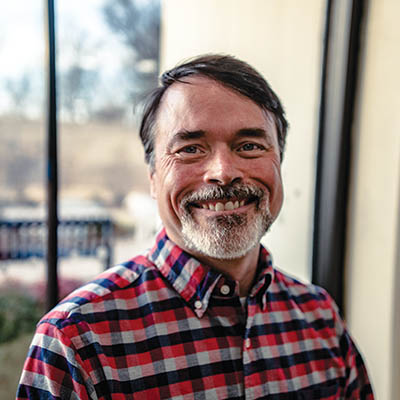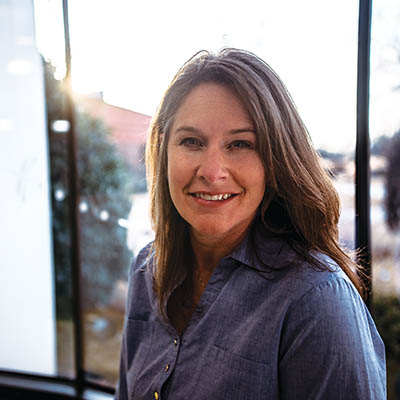What the teachers want
Oklahoma educators step out of the classroom and into the 57th Legislature
Maybe it’s the lack of tremble in their voices, or the sense of purpose in their statements. Or maybe it’s simply their willingness, even eagerness, to talk despite exhausting, all-consuming schedules. Whatever it is, you can sense the commitment of Oklahoma’s new educators-turned-legislators to the cause that got them elected.
It’s the same cause that inspired them to walk out of their classrooms and march for miles on wet asphalt. The cause that motivated them to knock on thousands of doors until their knuckles were raw. The cause that Oklahomans across the political spectrum told them was the most crucial to our state’s future—education.
 “We have a mission to do something about education,” said Rep. John Waldron of District 77. “Educators are poised to be the voice of the people on what the people clearly identified as the number-one issue.”
“We have a mission to do something about education,” said Rep. John Waldron of District 77. “Educators are poised to be the voice of the people on what the people clearly identified as the number-one issue.”
Previously a social studies teacher at Booker T. Washington, Waldron is now one of the 16 former teachers who will be a part of Oklahoma’s 57th legislative session when it convenes to organize at noon on Jan. 8.
For much of this freshmen class, education is their cause, their career, their lives—and the reason they won. Their commitment is proven by a shared conviction that as far as they have come since the walkout last spring, they still have so much further to go. Yet they don’t mourn this reality. They relish it.
“I almost haven’t had a chance to process what has happened because I haven’t been able to stop and catch my breath yet,” said Rep. Kelly Albright of District 95. “My hope is that the freshmen will be able to unite early on with our common goal of diverting from the status quo.”
“The walkout demonstrated that teachers could be strong and stand up for themselves. I think the voters wanted to see that,” Waldron said. “A lot of people appreciated seeing the teachers take that stand because we were fighting back.”
“Every door that we knocked on, education was a priority,” said Alicia Priest, president of the Oklahoma Education Association, herself a former middle school Spanish teacher. “I think the people of this state support their public schools. Period.”
Given the groundswell of grassroots support that helped sweep them into power, Oklahoma’s teachers-turned-lawmakers feel a sense of duty, perhaps even a burden, to deliver.
 “The opportunity is real,” said Rep. Melissa Provenzano, a former Bixby assistant principal now representing District 79. “We have a rare moment here in Oklahoma where we are on the same page about what needs to happen.”
“The opportunity is real,” said Rep. Melissa Provenzano, a former Bixby assistant principal now representing District 79. “We have a rare moment here in Oklahoma where we are on the same page about what needs to happen.”
While there’s tremendous excitement among the incoming legislators about the possibilities for education, there’s also a lot of trepidation about the realities of governing. None of them are naive enough to think working in the legislature will be easy. Oklahoma’s dismal ranking as 47th in the nation in Education Week’s 2017 “Quality Counts” report was years in the making.
Getting our state among the top 10 in education, as incoming Gov. Kevin Stitt said he hopes to do, will not happen overnight. That challenge may be even more daunting, given that the former mortgage lending company CEO was opposed to the teacher walkout as well as the funding package that brought it to an end.
“The systemic ineducation of our population has resulted in an electorate that continually votes for policy makers with a history of undermining education,” Albright said. “It’s becoming a cyclic problem that I’m certain was not unintentional. Despite that, I do still have a lot of hope for our future.”
Achieving that better future for Oklahoma’s public schools will mean accounting for years of institutional neglect. “The needs are tremendous after 10 years of budget cuts,” Waldron said. “We’ve had a chronic problem of underinvestment in our public institutions. We’ve got to make some hard choices.”
The word “representative” is especially appropriate for this new crop of lawmakers, as a legislative body represents the people who put them in office in the first place. So what does the 57th Legislature say about the Oklahoma voters who put them there last November? For many, the message cuts across party lines.
“When I went to Oklahoma City [for the walkout] and found myself not in the company of a few but well over 50,000, I realized that education is not a Democratic issue or a Republican issue. It’s an Oklahoman issue,” Provenzano said. “We all recognized the crisis we are in and worked together to affect real change.”
“A budget is an expression of your values. You show me where you’re putting your budget dollars and I’ll show you what your values are,” Waldron said. “Oklahomans are pro-education. It’s time our government was.”
It certainly sounds compelling, especially for public education’s staunchest supporters, but Oklahoma voters have heard it all before. “The politicians are always pro-education at the beginning of the session,” Waldron said. “The key is, are they going to be pro-education when it’s time to make the hard decisions?”
What makes teachers—these teachers, in particular—better suited for the challenges ahead? For Priest, it’s the very impulse that drove them into the profession in the first place.
“Teachers are lifelong learners,” Priest said. “That’s pretty exciting because they’ll hit the ground running.”
“Can teachers work better than attorneys? I think it’s worth trying out,” Waldron said. “Because we as teachers have all seen the problems in the system.”
Waldron and the other incoming legislators are confident that teachers are uniquely equipped to handle today’s challenges. It is a confidence borne from their experience in the classroom, and perhaps also from the scar tissue formed after years of feeling ignored and taken for granted.
“Teachers weren’t going to get their concerns heard just by asking nicely. We had a fight for a seat at the table. Because if you’re not at the table, you’re on the menu,” Waldron said.
“We’ve had a lot of talk about education reform over the last decade. But most of it seems to be handed to teachers by outside experts,” he continued. “If we are going to fix the problems in our schools, then maybe we should start from the grassroots. And that means teachers get to have a say in how they teach.”
“Even in the toughest schools, the dedication to Oklahoma children is real and the drive to see them succeed is tangible,” Provenzano said. “We must shine a light on and support [them] in meaningful ways, rather than new initiative after new initiative.”
Education is a priority for Oklahomans. The question is, how big of a mandate for change do educator-legislators have? More than a hundred candidates with an education background ran for office; only 16 won. At face value, this seems like a step back, especially for the movement that started with 50,000 strong last spring. But for the people supporting them, the 2018 election was a successful first step in a much longer march.
“We went from nine educators in the legislature to 26. That is an enormous jump,” Priest said. “Did all of the people that we wanted to see win, win? No. That’s not going to happen ever. But we’re certainly excited about the change and the makeup of the legislature for this upcoming session.”
Transforming campaign rhetoric into legislative results is a challenge as old as the Republic itself. Change will not come quickly or easily. It never does. And frankly, change may not come at all. But for the first time ever, perhaps, Oklahoma teachers have the opportunity to create their own destiny. Not just for themselves, but for the thousands of children across our state whose only hope for a better life begins in an Oklahoma classroom.
“Teaching is a political act. That’s why they made Socrates take poison so many years ago,” Waldron said. “People did not go into teaching to make a fortune, or because it was easy. Teachers got into it because they wanted to make things better. And teachers that go into the legislature—well, they’re basically doubling down.”
“Knocking on doors and talking to voters changed me forever,” Provenzano said. “I know that we are not so far apart in our values and beliefs, as it sometimes feels. You can find common ground with just about anyone if you only seek it. Once you have found it, you can begin to work together.”
Perhaps the biggest lesson these teachers learned from the walkout, and will be taking with them to Oklahoma City on Jan. 8, is paradoxical—any individual can make a difference, but only when they follow a cause bigger than themselves.
“I learned how powerful my voice was, even when it was shaking,” Albright said. “I think that typically we think of the loudest voice as the ones who are strongest, but often the quiet voices have a powerful and under-represented message. This was what gave me courage: knowing that others needed me to speak our message.”


.jpg)
.jpg)
